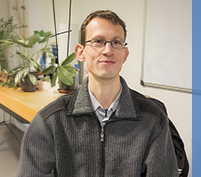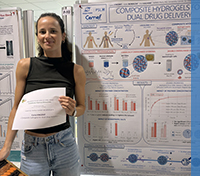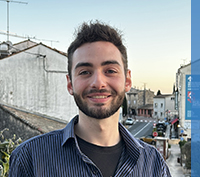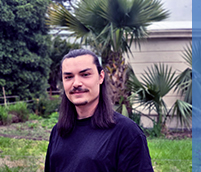Ghaniyya Medghoul will defend her PhD in Computational Mathematics, High Performance Computing and Data on Jan. 16, 23
A posteriori error estimation and adaptive control for a finite element solver framework with dynamic remeshing: application to quenching process

Ghaniyya Medghoul conducted her PhD work in the CFL team under the supervision of Elie Hachem and Aurélien Larcher. She will defend her PhD in Computational Mathematics, High Performance Computing and Data, on January 16th, 23 in front of the following jury:
– Nissrine Akkari, SafranTech, reviewer
– Joan Baiges, Polytechnical University of Catalogna, Spain, reviewer
– Alvaro Coutinho, Federal University of Rio de Janeiro, Brazil, reviewer
– Aurélien Larcher, CEMEF Mines Paris – PSL
– Elie Hachem, CEMEF Mines Paris – PSL
Abstract:
Quenching is a heat treatment process used to modify the mechanical properties of the forged, moulded or welded metal part. It consists of heating a workpiece to change its microstructure and its properties like hardness, resistance and toughness. The workpiece is then cooled in a medium (oil, water, polymer solution or air). This process is commonly used to harden and reinforce metal parts for the automotive and aerospace sectors such as rings and gears and other transmission parts. It is also used in construction sector to avoid bards' and rods' distortions and in the energy domain (for example, seamless rolled crowns).
Nowadays, with the improvement of computing power, the numerical simulation of this process become an essential tool to predict physical phenomena charactering this process such as temperature and cooling velocity, these last two are essential factors allowing to determine final characteristics of the material. Numerical simulation is an excellent tool to understand those results and to optimize them.
However, the simulation of such phenomena posed scientific difficulties because their resolution implies long computational times despite the use of important computational resources.
In this thesis, we are interested in the resolution of complex long time and large scale problems heat transfer and fluid flow problems. The goal is to offer a general adaptive stopping criteria for each iterative solver used in the aim of reducing the number of iterations and computational time. Those criteria are based on a posteriori error estimators computed on mesh's edges and based on recovery procedures. Those estimators are initially used to lead the anisotropic adaptive process to refine the mesh locally in the regions of interest. They allow to measure the quality of the approximated numerical solution by providing entirely computable upper bounds on the error between the exact solution and the approximated one.
Our numerical tests highlight the accuracy of the estimators used and the reduction in terms of iterations' number and computational cost, this reflects the efficiency of our adaptive method. The numerical framework has been validated by confrontations with experimental results provided by our industrial partners.
Keywords: a posteriori error estimation, stopping criterion, CFD modelling, anisotropic mesh adaptation, Non-smooth interpolation operators, stabilized finite elements









